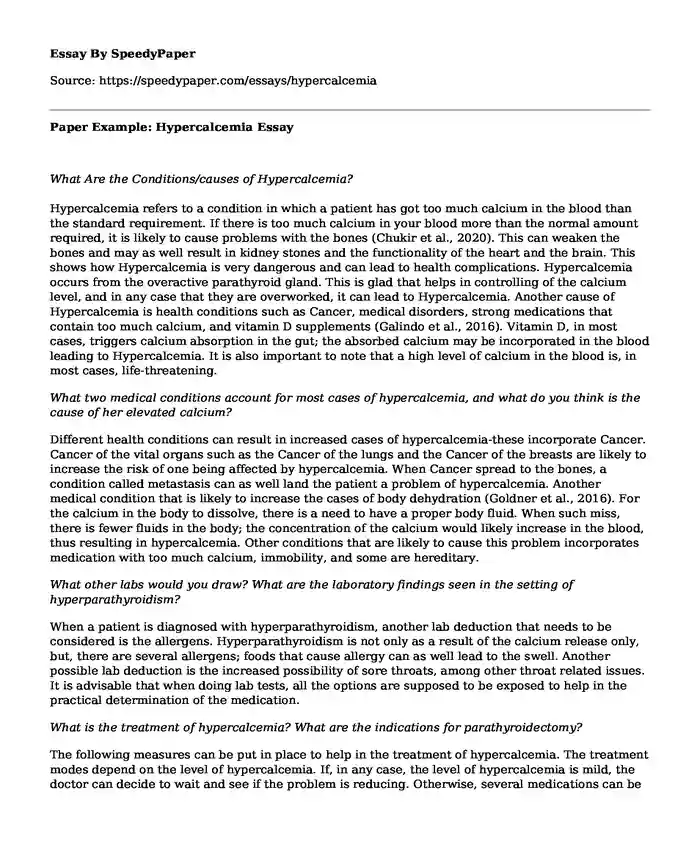What Are the Conditions/causes of Hypercalcemia?
Hypercalcemia refers to a condition in which a patient has got too much calcium in the blood than the standard requirement. If there is too much calcium in your blood more than the normal amount required, it is likely to cause problems with the bones (Chukir et al., 2020). This can weaken the bones and may as well result in kidney stones and the functionality of the heart and the brain. This shows how Hypercalcemia is very dangerous and can lead to health complications. Hypercalcemia occurs from the overactive parathyroid gland. This is glad that helps in controlling of the calcium level, and in any case that they are overworked, it can lead to Hypercalcemia. Another cause of Hypercalcemia is health conditions such as Cancer, medical disorders, strong medications that contain too much calcium, and vitamin D supplements (Galindo et al., 2016). Vitamin D, in most cases, triggers calcium absorption in the gut; the absorbed calcium may be incorporated in the blood leading to Hypercalcemia. It is also important to note that a high level of calcium in the blood is, in most cases, life-threatening.
What two medical conditions account for most cases of hypercalcemia, and what do you think is the cause of her elevated calcium?
Different health conditions can result in increased cases of hypercalcemia-these incorporate Cancer. Cancer of the vital organs such as the Cancer of the lungs and the Cancer of the breasts are likely to increase the risk of one being affected by hypercalcemia. When Cancer spread to the bones, a condition called metastasis can as well land the patient a problem of hypercalcemia. Another medical condition that is likely to increase the cases of body dehydration (Goldner et al., 2016). For the calcium in the body to dissolve, there is a need to have a proper body fluid. When such miss, there is fewer fluids in the body; the concentration of the calcium would likely increase in the blood, thus resulting in hypercalcemia. Other conditions that are likely to cause this problem incorporates medication with too much calcium, immobility, and some are hereditary.
What other labs would you draw? What are the laboratory findings seen in the setting of hyperparathyroidism?
When a patient is diagnosed with hyperparathyroidism, another lab deduction that needs to be considered is the allergens. Hyperparathyroidism is not only as a result of the calcium release only, but, there are several allergens; foods that cause allergy can as well lead to the swell. Another possible lab deduction is the increased possibility of sore throats, among other throat related issues. It is advisable that when doing lab tests, all the options are supposed to be exposed to help in the practical determination of the medication.
What is the treatment of hypercalcemia? What are the indications for parathyroidectomy?
The following measures can be put in place to help in the treatment of hypercalcemia. The treatment modes depend on the level of hypercalcemia. If, in any case, the level of hypercalcemia is mild, the doctor can decide to wait and see if the problem is reducing. Otherwise, several medications can be used, including calcitonin that control the calcium level, calcimimetics, help in the managing of the overactive parathyroid glands, which put a patient at more risk of contracting the diseases. One of the best-recommended treatment strategies is the surgical and the removal of the overactive parathyroid. Parathyroidectomy is done when the swell is more significant that the medication cannot reduce.
What else would you address at this visit?
During this visit, it would be vital to do a check on the cardiac failure possibilities. This is because the calcium concentration may have resulted in the blockage of the main artery, which may lead to heart conditions.
Reference
Chukir, T., Liu, Y., Hoffman, K., Bilezikian, J. P., & Farooki, A. (2020). Calcitriol Elevation Is Associated with a Higher Risk of Refractory Hypercalcemia of Malignancy in Solid Tumors. The Journal of Clinical Endocrinology & Metabolism, 105(4), dgz278. https://academic.oup.com/jcem/article-abstract/105/4/dgz278/5679485
Galindo, R. J., Romao, I., Valsamis, A., Weinerman, S., & Harris, Y. T. (2016). Hypercalcemia of malignancy and colorectal Cancer. World Journal of Oncology, 7(1), 5. https://www.ncbi.nlm.nih.gov/pmc/articles/PMC4797652/
Goldner, W. (2016). Cancer-related hypercalcemia. Journal of oncology practice, 12(5), 426-432. https://ascopubs.org/doi/abs/10.1200/jop.2016.011155
Grill, V., Ho, P., Body, J. J., Johanson, N., Lee, S. C., Kukreja, S. C., Martin, T. J. (1991). Parathyroid hormone-related protein: elevated levels in both humoral hypercalcemia of malignancy and hypercalcemia complicating metastatic breast cancer. The Journal of Clinical Endocrinology & Metabolism, 73(6), 1309-1315. https://academic.oup.com/jcem/article-abstract/73/6/1309/2653648
Jick, S., Li, L., Gastanaga, V. M., Liede, A., & Hernandez, R. K. (2017). Prevalence of hypercalcemia of malignancy among pediatric cancer patients in the UK Clinical Practice Research Datalink database. Clinical epidemiology, 9, 339. https://www.sciencedirect.com/science/article/pii/S1938973618301946
Cite this page
Paper Example: Hypercalcemia. (2023, May 01). Retrieved from https://speedypaper.com/essays/hypercalcemia
Request Removal
If you are the original author of this essay and no longer wish to have it published on the SpeedyPaper website, please click below to request its removal:
- Population Growth Essay Example
- Essay Sample on the Educational Issue: Courses Outside One's Field of Study
- Free Essay on the Benefits of Corporate Social Responsibility
- Free Essay on Understanding Management
- Essay Sample on the Media Lifecycle and Media Effect on Society
- Free Essay on Selling Is the Pillar of Any Enterprise
- Essay Sample on Microsoft Queries and Clinical Services
Popular categories





